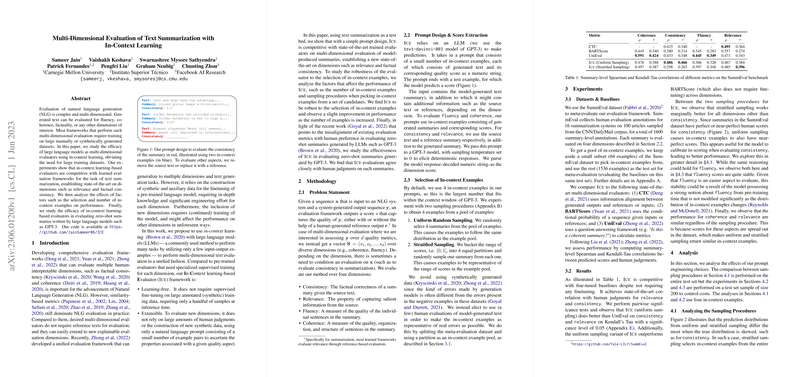Multi-Dimensional Evaluation of Text Summarization with In-Context Learning
The paper "Multi-Dimensional Evaluation of Text Summarization with In-Context Learning" tackles the multifaceted challenge of evaluating natural language generation (NLG), and specifically text summarization, via a novel approach that leverages in-context learning with LLMs. Traditional evaluation metrics like BLEU and ROUGE are often limited to assessing textual similarity, which may not perfectly align with human judgments concerning different quality dimensions such as fluency, coherence, and factual consistency. This work seeks to demonstrate that LLMs, through in-context examples, can effectively serve as versatile evaluators that do not require the heavy reliance on large datasets and significant engineering typically necessary for such tasks.
The methodology employed in this work involves the use of few-shot learning from prompt-based models, specifically utilizing the GPT-3 model's capabilities to provide multi-dimensional evaluations based on quality aspects derived from a minimal number of examples. This approach is detailed as the "Ice" framework, which is learning-free, extensible, and minimizes the need for synthetic data creation. In this framework, the evaluations are segmented into four main quality dimensions: consistency, relevance, fluency, and coherence.
A significant part of the paper is the empirical analysis using the SummEval dataset, which provides human-evaluation annotations across these dimensions. The results indicate that Ice not only competes with fine-tuned evaluative models but also surpasses them in certain respects, notably in relevance and consistency. The work provides robust evidence that selection and quantity of in-context examples have a marginal but interesting impact on performance, with the model demonstrating robustness against variations in example selection.
Another essential contribution of the paper is the comparative analysis with current state-of-the-art evaluators like CTC, BARTScore, and UniEval. Although these models integrate complex, trained frameworks for multi-dimensional evaluation, Ice achieves competitive, and sometimes superior, results without the need for supervised training. This suggests that Ice could serve as a cost-effective, less resource-intensive alternative or complement to existing methods.
The research extends to the evaluation of zero-shot summaries generated by LLMs like GPT-3, showcasing Ice's alignment with human judgment over summaries from models lacking substantial reference training. This aspect of the paper suggests Ice’s potential as an evaluator genuinely understanding text quality aspects as perceived by human evaluators.
Going forward, these findings have profound implications for the development of evaluative frameworks in AI. The Ice framework suggests a future direction where evaluation systems can dynamically incorporate feedback and extend their operability across different text domains and languages without intensive retraining. This approach could streamline the integration of evolving quality dimensions into LLM evaluation tasks, potentially harmonizing machine understanding with human-like assessment more closely.
The research offers a critical perspective on the next steps in AI evaluation, stressing the importance of adopting flexible, efficient, and human-like evaluative mechanisms using cutting-edge LLM capabilities. This paper prompts further investigation into the generalizability of in-context learning approaches across varied NLG tasks and linguistic setups, paving the way for innovative developments in AI evaluation methodologies.
